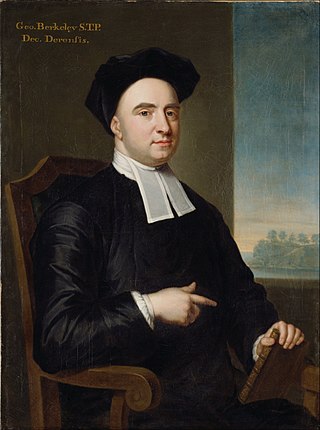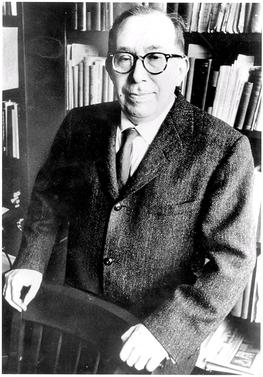Related Research Articles

George Berkeley – known as Bishop Berkeley – was an Anglo-Irish philosopher whose primary achievement was the advancement of a theory he called "immaterialism". This theory denies the existence of material substance and instead contends that familiar objects like tables and chairs are ideas perceived by the mind and, as a result, cannot exist without being perceived. Berkeley is also known for his critique of abstraction, an important premise in his argument for immaterialism.

Emmanuel Levinas was a French philosopher of Lithuanian Jewish ancestry who is known for his work within Jewish philosophy, existentialism, and phenomenology, focusing on the relationship of ethics to metaphysics and ontology.

Jorge Agustín Nicolás Ruiz de Santayana y Borrás, known in English as George Santayana, was a Spanish-American philosopher, essayist, poet, and novelist. Born in Spain, Santayana was raised and educated in the US from the age of eight and identified himself as an American, although he always retained a valid Spanish passport. At the age of 48, Santayana left his position at Harvard and returned to Europe permanently.

Leo Strauss was a German-American scholar of political philosophy who specialized in classical political philosophy. Born in Germany to Jewish parents, Strauss later emigrated from Germany to the United States. He spent much of his career as a professor of political science at the University of Chicago, where he taught several generations of students and published fifteen books.
A Secular Humanist Declaration was an argument for and statement of support for democratic secular humanism. The document was issued in 1980 by the Council for Democratic and Secular Humanism (CODESH), now the Council for Secular Humanism (CSH). Compiled by Paul Kurtz, it is largely a restatement of the content of the American Humanist Association's 1973 Humanist Manifesto II, of which he was co-author with Edwin H. Wilson. Both Wilson and Kurtz had served as editors of The Humanist, from which Kurtz departed in 1979 and thereafter set about establishing his own movement and his own periodical. His Secular Humanist Declaration was the starting point for these enterprises.

Stanley Louis Cavell was an American philosopher. He was the Walter M. Cabot Professor of Aesthetics and the General Theory of Value at Harvard University. He worked in the fields of ethics, aesthetics, and ordinary language philosophy. As an interpreter, he produced influential works on Wittgenstein, Austin, Emerson, Thoreau, and Heidegger. His work is characterized by its conversational tone and frequent literary references.

Princeton University Press is an independent publisher with close connections to Princeton University. Its mission is to disseminate scholarship within academia and society at large.

George Trumbull Ladd was an American philosopher, educator and psychologist.

Frugality is the quality of being frugal, sparing, thrifty, prudent, or economical in the consumption of resources such as food, time or money, and avoiding waste, lavishness or extravagance.

Theodor Lipps was a German philosopher, famed for his theory regarding aesthetics, creating the framework for the concept of Einfühlung (empathy), defined as, "projecting oneself onto the object of perception." This has then led onto opening up a new branch of interdisciplinary research in the overlap between psychology and philosophy.
Patrick Colonel Suppes was an American philosopher who made significant contributions to philosophy of science, the theory of measurement, the foundations of quantum mechanics, decision theory, psychology and educational technology. He was the Lucie Stern Professor of Philosophy Emeritus at Stanford University and until January 2010 was the Director of the Education Program for Gifted Youth also at Stanford.
Traditionalist conservatism, often known as classical conservatism, is a political and social philosophy that emphasizes the importance of transcendent moral principles, manifested through certain natural laws to which society should adhere prudently. Traditionalist conservatism is based on Edmund Burke's political views. Traditionalists value social ties and the preservation of ancestral institutions above excessive individualism.
Peter J. Caws was a British American philosopher and administrator, and University Professor of Philosophy and Professor of Human Sciences at the George Washington University.
Jnana Deepa (JD), Institute for Philosophy and Theology is located at Pune, India. It is the academic component of Papal Seminary, Pontificium Athenaeum Kandiensis seu Pooniensis. Established by the Jesuits in Kandy in 1893, it was transferred to Pune (India) in 1955. Catering primarily to the formation of candidates to the Catholic priesthood it is run by the Society of Jesus for the education and formation of future Catholic leaders.

Anti-intellectualism is hostility to and mistrust of intellect, intellectuals, and intellectualism, commonly expressed as deprecation of education and philosophy and the dismissal of art, literature, and science as impractical, politically motivated, and even contemptible human pursuits. Anti-intellectuals present themselves and are perceived as champions of common folk—populists against political and academic elitism—and tend to see educated people as a status class that dominates political discourse and higher education while being detached from the concerns of ordinary people.
The study and teaching of philosophy in Canada date from the time of New France. Generally, Canadian philosophers have not developed unique forms of philosophical thought; rather, Canadian philosophers have reflected particular views of established European and later American schools of philosophical thought, be it Thomism, Objective Idealism, or Scottish Common Sense Realism. Since the mid-twentieth century the depth and scope of philosophical activity in Canada has increased dramatically. This article focuses on the evolution of epistemology, logic, the philosophy of mind, metaphysics, ethics and metaethics, and continental philosophy in Canada.

Richard De Smet was a Belgian Jesuit priest, and missionary in India. As Indologist he became a renowned Sankara specialist.
The Journal of Business Ethics Education is a peer-reviewed academic journal that examines the particular challenges facing business ethics educators. It publishes articles, case studies, and reviews intended to help instructors do a better job in the classroom. Established in 2004, the journal is edited by John Hooker at Carnegie Mellon University, and published by NeilsonJournals Publishing in print and electronic formats. The journal is also available online from the Philosophy Documentation Center.

The CEVRO Institute is a private university in Prague, Czech Republic, established in 2005 by CEVRO, a think-tank affiliated with the Civic Democratic Party (ODS).
References
- ↑ "Richard T DeGeorge". Department of Philosophy. 11 March 2014.